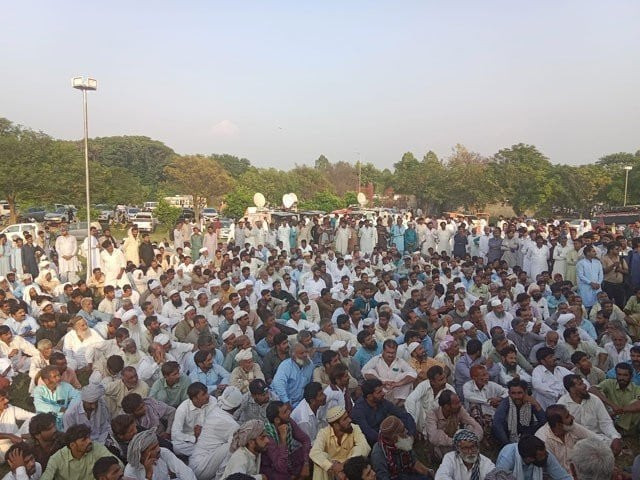Farmers protest in Islamabad for fulfillment of demands
Kisan Ittehad threatens to march towards D-chowk if relief in electricity, fertiliser prices not granted

Farmers, led by the Kisan Ittihad (Farmer’s union), are protesting against the high cost of electricity and fertilisers as they staged a sit-in at the federal capital after crossing multiple barriers and obstacles that were placed to block the protest.
The protestors have threatened to march on towards the D-Chowk area, where important government installations are located.
The rally had entered Islamabad via Grand Trunk road on Wednesday and staged a sit-in at Blue Area – the city’s central business hub merely a few kilometres away from the Red Zone.
Read Body to consider electricity relief
Despite several attempts by the administration, negotiations have not yet been possible with the protestors.
اسلام آباد میں کسانوں کا سونامی !
— Bilal Khan (@BilalKhan78) September 29, 2022
کسانوں نے کنٹینر ہٹا کر اسلام آباد میں داخل ہو گئے.
کسانوں کے مطالبات جب تک پورے نہیں کیے جاتے کسان دھرنا دے گے، کسان اتحاد۔ ہمارا لفافہ میڈیا یہ کیوں نہیں دکھا رہا؟ #AudioLeaks #FarmerProtest pic.twitter.com/qNInZHsHdi
It may also be noted that the administration had also proposed an alternate venue for the sit-in, however, the protestors ignored the government's proposition.
The farmers are demanding that the additional taxes included in electricity bills should be removed immediately and action should be taken against those selling fertiliser in the black market.
A large number of farmers are moving towards D Chowk, the farmers are being economically exploited#کسان_قوم_کا_محسن#کرپٹ_حکومت_اورمہنگائی pic.twitter.com/2nGBsQu8qU
— ⊰⊱🦋قرثم🦋PTI🦋 (@Qursum12) September 29, 2022
Lest their demands are met, the protestors vow to march toward the Red Zone and continue the sit-in.
Read More Miftah says PM wants further relief on electricity rates
The farmer’s protest poses a fresh challenge to the Pakistan Muslim League-Nawaz (PML-N) led government that already has a mammoth task of tackling a fragile economy and widespread flood-devastation on its hands.
Pakistan's new finance minister Ishaq Dar said on Wednesday he will work to rein in inflation while cutting interest rates, saying the rupee was undervalued and promising a strong response to the South Asian nation's worst economic crisis.
In his fourth time on the job, the chartered accountant is facing a balance of payment crisis, foreign reserves that cover barely a month's imports, historic lows in the rupee, inflation exceeding 27% and the aftermath of devastating floods.
Furthermore, high electricity bills coupled with the heavy burden of Fuel Adjustment Charges (FCA) and other taxes have raised input costs, making it unaffordable for consumers.



















COMMENTS
Comments are moderated and generally will be posted if they are on-topic and not abusive.
For more information, please see our Comments FAQ